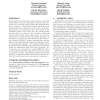Free Online Productivity Tools
i2Speak
i2Symbol
i2OCR
iTex2Img
iWeb2Print
iWeb2Shot
i2Type
iPdf2Split
iPdf2Merge
i2Bopomofo
i2Arabic
i2Style
i2Image
i2PDF
iLatex2Rtf
Sci2ools
PETRA
2015
ACM
2015
ACM
HMAGIC: head movement and gaze input cascaded pointing
Augmentative and alternative communication tools allow people with severe motor disabilities to interact with computers. Two commonly used tools are video-based interfaces and eye trackers. Video-based interfaces map head movements captured by a camera to mouse pointer movements. Alternatively, eye trackers place the mouse pointer at the estimated position of the user’s gaze. Eye tracking based interfaces have been shown to even outperform traditional mice in terms of speed, however the accuracy of current eye trackers is not enough for fine mouse pointer placement. In this paper we propose the Head Movement And Gaze Input Cascaded (HMAGIC) pointing technique that combines head movement and gaze-based inputs in a fast and accurate mouse-replacement interface. The interface initially places the pointer at the estimated gaze position and then the user makes fine adjustments with their head movements. We conducted a user experiment to compare HMAGIC with a mouse-replacement interface...
| Added | 16 Apr 2016 |
| Updated | 16 Apr 2016 |
| Type | Journal |
| Year | 2015 |
| Where | PETRA |
Comments (0)

